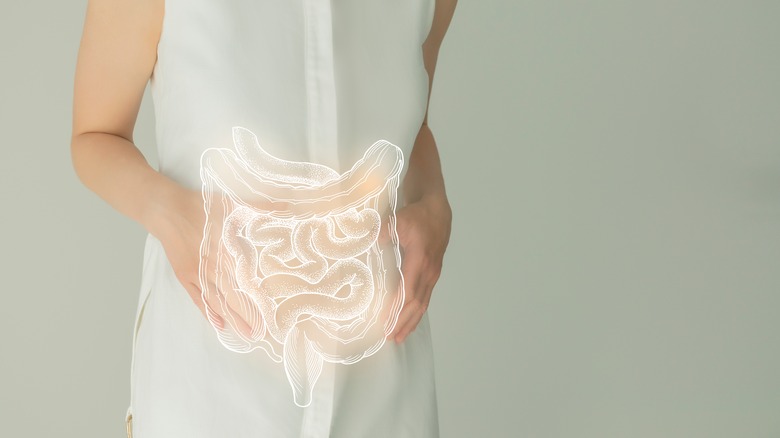Colitis Versus IBS: What's The Difference?
The digestive system is composed of several organs, including the small and large intestines. The longest part of the large intestine is the colon, which is responsible for absorbing water and electrolytes from undigested food and eliminating waste material from the body (via National Cancer Institute).
The intestines play a role in the immune system by protecting the body against harmful pathogens and bacteria that can enter the body through food or water (via Yale University). Maintaining good bowel health is important for overall health and well-being and can help prevent various digestive and bowel disorders.
Bowel disorders refer to a group of conditions that affect the small and large intestines, per Healthline. These disorders are characterized by symptoms such as abdominal pain, bloating, and changes in bowel habits. According to Medical News Today, colitis and irritable bowel syndrome (IBS) are two disorders that affect the digestive system. Although both conditions can cause gut issues, they have some important differences which are worth noting.
What's the difference between colitis and IBS?
According to the Cleveland Clinic, colitis refers to inflammation of the colon. There are several different types of colitis, including Crohn's disease, infectious colitis, ulcerative colitis, ischemic colitis, and microscopic colitis. Colitis is typically a chronic condition and can be caused by a variety of factors, including autoimmune disorders, infections, and a lack of blood flow to the colon. Symptoms of colitis can include abdominal pain, diarrhea (often with blood), rectal bleeding, weight loss, and fatigue (via the Mayo Clinic). Colitis can be diagnosed through a physical examination, laboratory tests, and imaging studies such as a CT scan or colonoscopy.
IBS, on the other hand, affects the way the colon functions, per the Mayo Clinic. It is characterized by abdominal pain, cramping, bloating, gas, diarrhea, and constipation. IBS is believed to be caused by various factors, such as muscle contractions in the digestive tract, infection, and changes in the bacteria in the gut. However, it is also triggered by emotional distress and sensitivity to certain foods.
In summary, colitis is a type of inflammation of the colon, while IBS is a disorder that affects the way the colon functions.
How are colitis and IBS treated?
The treatments of colitis and irritable bowel syndrome (IBS) differ in several ways. Colitis treatment typically involves reducing inflammation and managing symptoms. Medications, such as anti-inflammatory drugs and corticosteroids, can be used to reduce inflammation and suppress the immune system, per the Mayo Clinic. Immunosuppressants, such as azathioprine can also be used to suppress the immune system and prevent it from attacking the cells in the colon. Lifestyle changes, such as making dietary changes and getting regular exercise, can also help to manage symptoms of stress and prevent flare-ups. In severe cases, surgery may be necessary to remove part or all of the colon.
Treatment for IBS typically involves managing symptoms and improving daily functioning. Medications, such as antidepressants, can help to reduce abdominal pain and improve bowel movements (via the Mayo Clinic). According to Johns Hopkins Medicine, certain probiotics may also be helpful in managing IBS symptoms. Making dietary changes (such as eliminating trigger foods, and increasing fiber intake) along with various stress management techniques may also be beneficial in reducing the frequency and severity of IBS symptoms, per the Mayo Clinic.



